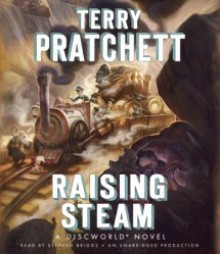
This is the third Discworld novel to feature Moist von Lipwig as a protagonist. I've listened to the first, Going Postal, many times and fully expected to love Raising Steam. Unfortunately, it didn't quite work for me.
In this book, the Discworld gets its first locomotives. Dick Simnel, a self-taught engineer, invents and improves the things, spending a great deal of time on his pride and joy, Iron Girder (while listening, I thought it was spelled Iron Gerda). Sir Harry King, looking for something more respectable to attach his name to than waste and sanitation, agrees to finance Dick's project, and Vetinari assigns Moist von Lipwig to the project as a government representative. Moist's charm and quick thinking come in handy as he struggles to get the land agreements necessary for the locomotive project to be successful. Meanwhile, Vetinari is adamant that the train must go to Überwald, and his timetable may be tighter than even Moist can handle. Dwarfish fundamentalists in Überwald and Ankh-Morpork add another level of difficulty.
Raising Steam was just as quotable as any other Discworld book, and, once again, Stephen Briggs' narration was fabulous. Unfortunately, I haven't yet read Thud! and Snuff, both of which I think might have provided the background for the tensions between the dwarves and trolls and the status of the goblins. Also, the steam locomotive stuff didn't interest me much, in part because I'm just not a train enthusiast, but also because Moist didn't really have much to do with any of it.
In Going Postal, Moist was the driving force behind the resurrection and improvement of the Ankh-Morpork postal service. I loved seeing him think on his feet. He constantly raised the stakes and acted far more confident about his chances for success than he really was. In Raising Steam, most of the nitty gritty details of the trains and railway were worked out by other people. Moist was primarily on the sidelines. He was an important character – his negotiation skills were vital – but he felt more like one small part of the whole than like the driving force behind all of it. I missed seeing him have a more prominent role, and Dick Simnel and the others just weren't interesting enough to me to make up for that.
Before I wrap things up: this was the first Discworld book that prompted me to wonder where the same-sex couples were in the series. There was a moment that made me think a couple characters were going to turn out to be a secret gay couple, which made me realize I couldn't recall any gay or lesbian couples in the series, so it was all the more disappointing when my suspicions about those two characters turned out to not be correct. It didn't really affect how I felt about the book, but I did see it as a missed opportunity.
All in all, Raising Steam was disappointing but not necessarily bad. I think I liked it more than the Rincewind books, but less than most every other Discworld book I've read. However, I do plan on giving it another go after I've read Thud! and Snuff, just to see if that improves my opinion of it.
(Original review posted on A Library Girl's Familiar Diversions.)

 Log in with Facebook
Log in with Facebook 





